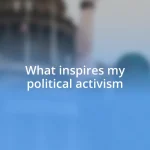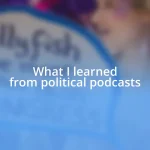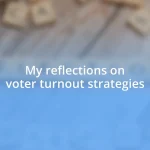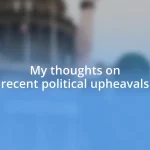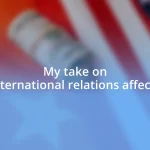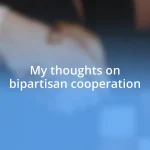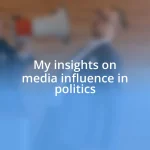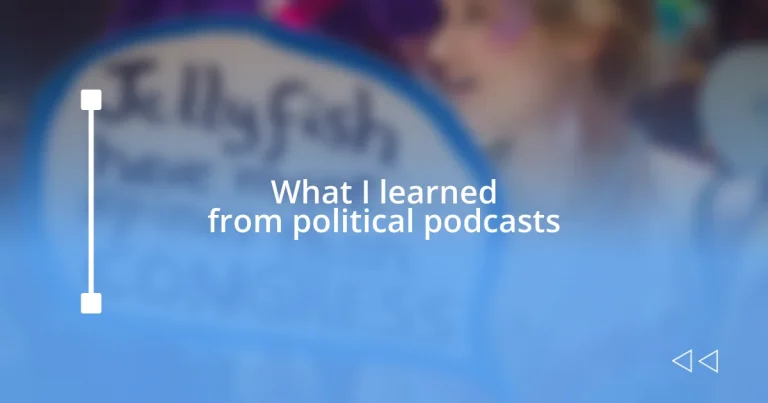Key takeaways:
- Grassroots activism highlights the power of collective action and individual voices in driving political change.
- Listening to political podcasts enhances understanding of complex issues, encourages diverse perspectives, and sharpens critical thinking skills.
- Applying lessons from podcasts can lead to local engagement, political activism, and improved discourse in challenging conversations.
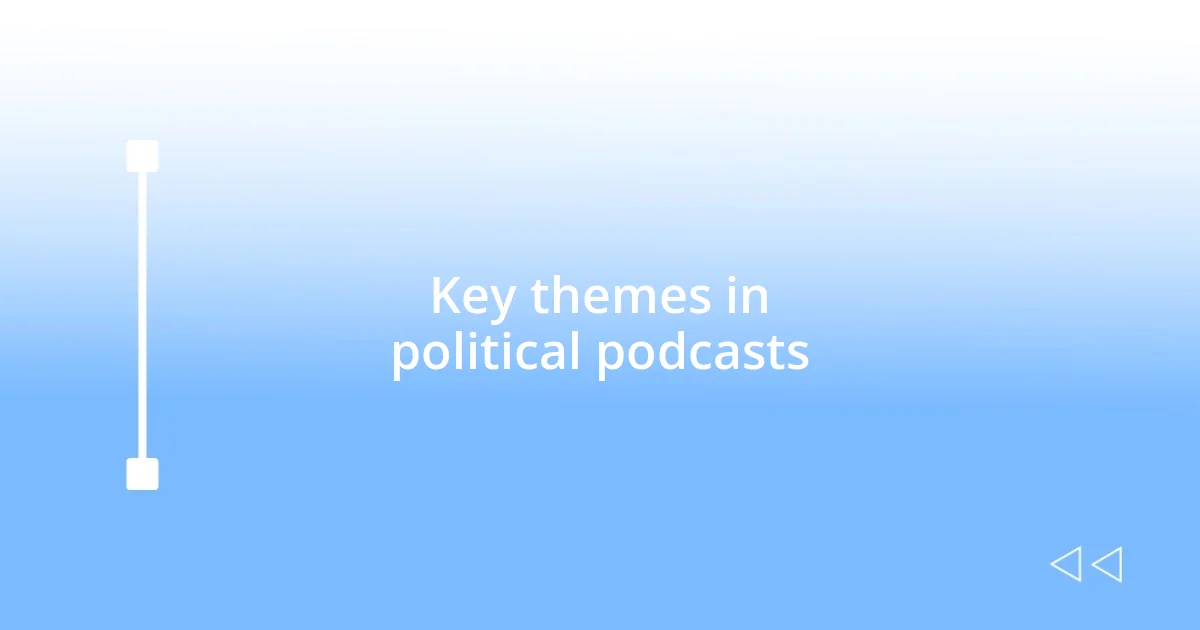
Key themes in political podcasts
One of the key themes I often encounter in political podcasts is the concept of grassroots activism. I remember tuning into an episode where the host shared stories of everyday individuals rallying for change in their communities—this really struck a chord with me. It’s incredible how these grassroot movements often highlight the power of collective action, making me ponder the question: Can a single voice truly create a ripple effect in such a vast political landscape?
Another theme that stands out is the exploration of policy implications and their real-world impacts. Recently, I listened to a podcast that dissected climate policy, and I was left feeling both informed and empowered. It made me realize how crucial it is to understand the nuances of legislation—how many of us really grasp how these policies affect our daily lives? This insight transformed my approach to discussions around political change; rather than just absorbing information, I started engaging actively with the issues.
Finally, the theme of political polarization emerges consistently in many conversations. Hearing different viewpoints sometimes leaves me feeling uncomfortable, yet this discomfort often sparks deeper reflection. I can recall sitting in my car, listening to a debate on a controversial topic, and feeling a mix of frustration and curiosity. It made me ask myself: How can we bridge these divides if we only listen to voices that echo our own? This theme urges me to seek out diverse perspectives, fostering an environment where dialogue can thrive.
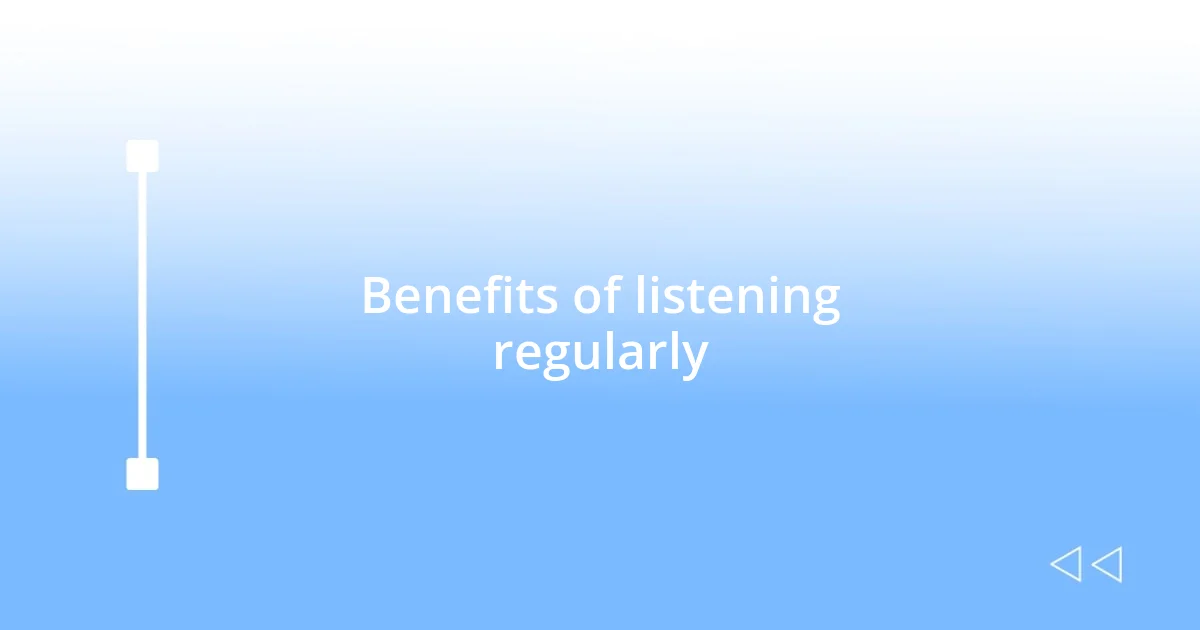
Benefits of listening regularly
Listening to political podcasts regularly has transformed my understanding of current events. For instance, I remember a particular episode that delved into the intricacies of the voting process—it was both eye-opening and grounding. I found myself nodding along, realizing that knowledge is power, especially in a democracy where every vote counts.
Another notable benefit is the diverse perspectives that each episode offers. There was a time when I felt overwhelmed by the sheer volume of political noise around me. However, as I tuned into different voices via podcasts, I suddenly felt more connected to the broader conversation. It’s as if each host invited me into their world, sharing unique insights that reshaped my views on contentious issues.
Lastly, I can’t overlook how regular listening has sharpened my critical thinking skills. I vividly recall a podcast episode where the guest presented an argument I strongly disagreed with. Instead of dismissing it outright, I found myself dissecting their points, weighing the validity of their claims. This experience not only pushed me to develop well-rounded opinions but also encouraged me to engage in thoughtful discussions with friends.
| Benefit | Description |
|---|---|
| Informed Understanding | Regular listening helps grasp the nuances of political topics, enriching knowledge. |
| Diverse Perspectives | Exposure to various viewpoints fosters empathy and broadens one’s own viewpoint. |
| Critical Thinking | Enhances ability to analyze arguments and formulate reasoned opinions. |
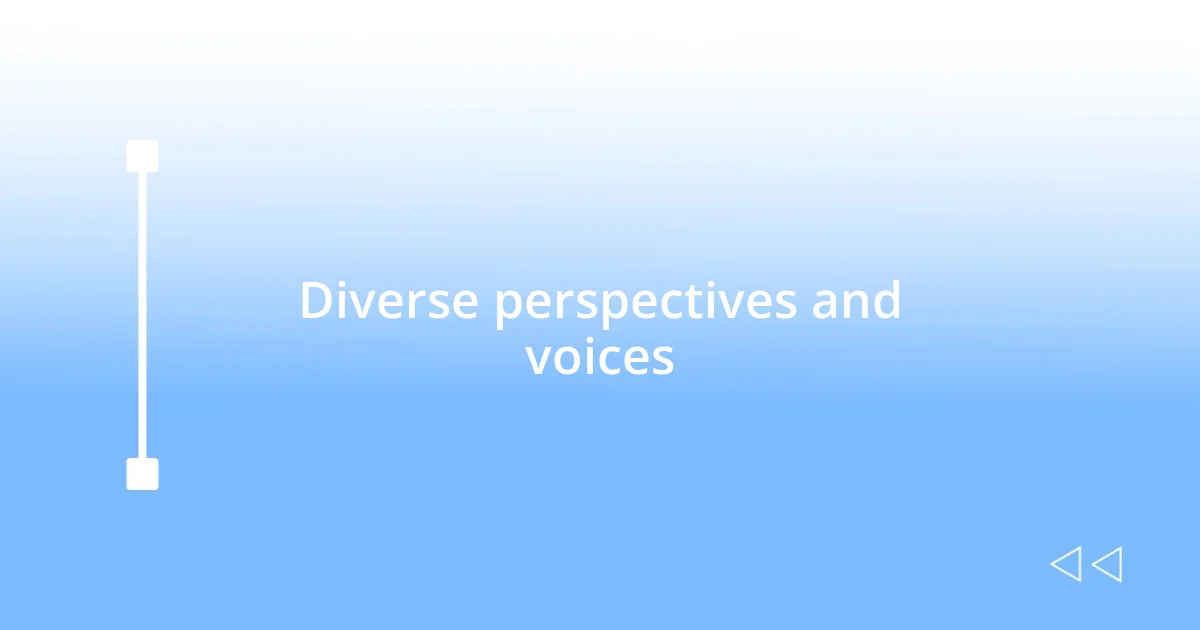
Diverse perspectives and voices
Diving into political podcasts has opened up a treasure trove of diverse perspectives for me. I recall one episode featuring a guest who grew up in a vastly different socio-economic environment than mine. Their experience of political engagement was a vivid contrast to my own, and it struck me how different life circumstances shape our views. This realization deepened my appreciation for the multitude of voices and experiences that contribute to our political discourse.
- Through these conversations, I’ve learned that:
- Diversity Enriches Dialogue: Different backgrounds provide fresh insights that challenge my assumptions.
- Empathy Grows: Hearing personal stories helps humanize complex political issues, fostering compassion.
- Complexity Revealed: I appreciate how multifaceted political opinions can be, urging me to consider shades of gray rather than black and white.
It’s fascinating how certain podcasts spark my curiosity about other cultures and ideologies. I remember a lively discussion on immigration policy where guests shared contrasting narratives. Their passionate expressions and heartfelt stories made me realize the importance of understanding experiences that differ from my own. It left me with a lingering question: How do we create a political landscape where all voices feel valued? Each episode reminds me of the rich tapestry of opinions waiting to be explored, encouraging me to stay curious and open-minded.
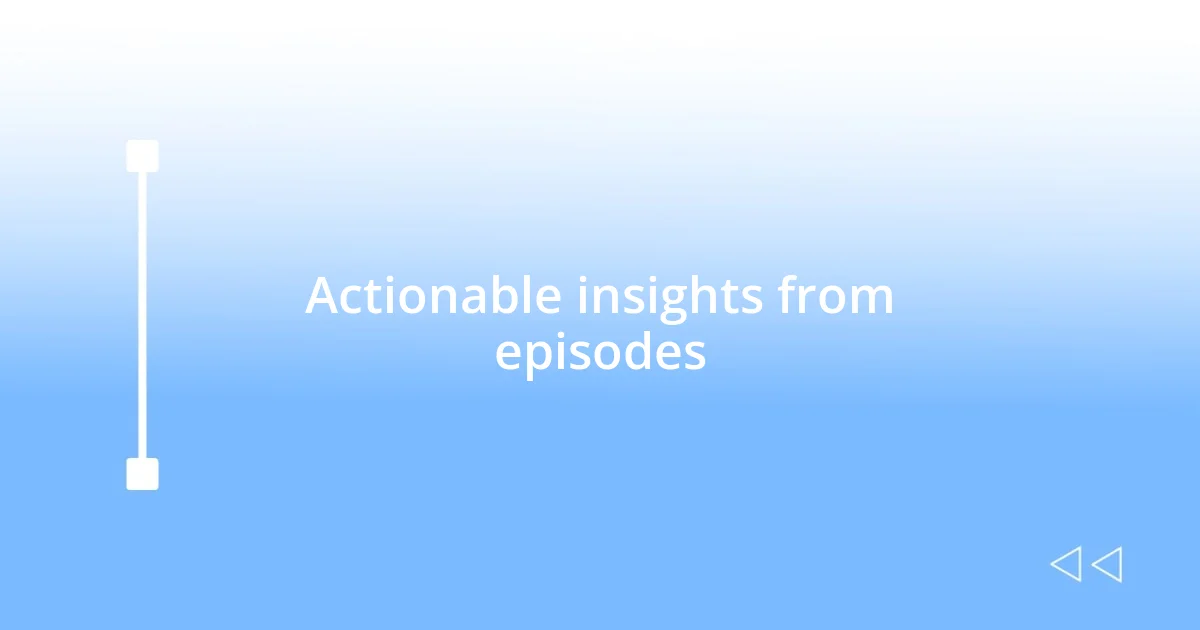
Actionable insights from episodes
One actionable insight I gained from a political podcast episode was the importance of local activism. I distinctly remember listening to an interview with a grassroots organizer. They passionately shared how small, community-driven initiatives can lead to significant local change. It made me reflect on my surroundings and consider how I could contribute to similar efforts in my neighborhood. Have you thought about what issues you care about locally? It’s empowering to realize you can make a difference right where you are.
Another takeaway involved the art of engaging in difficult conversations. In one episode, the host discussed strategies for discussing politically charged topics with family members. I had an enlightening experience after using one of their tips during a holiday dinner—it transformed a potentially heated debate into a respectful dialogue. I learned that asking open-ended questions, rather than making declarations, can invite more thoughtful responses. Who knew that simply changing the way I approached a conversation could foster understanding?
Lastly, I’ve discovered the value of staying informed about legislative processes. In a riveting episode, experts broke down how bills are created and passed in Congress. I took this knowledge to heart during the last election cycle and found myself more equipped to discuss ballot measures intelligently. This understanding empowered me to scrutinize candidates’ promises and evaluate their implications critically. Do you feel prepared to analyze political promises? Each episode I listen to not only fills me with knowledge but also equips me with practical skills for navigating the political landscape.
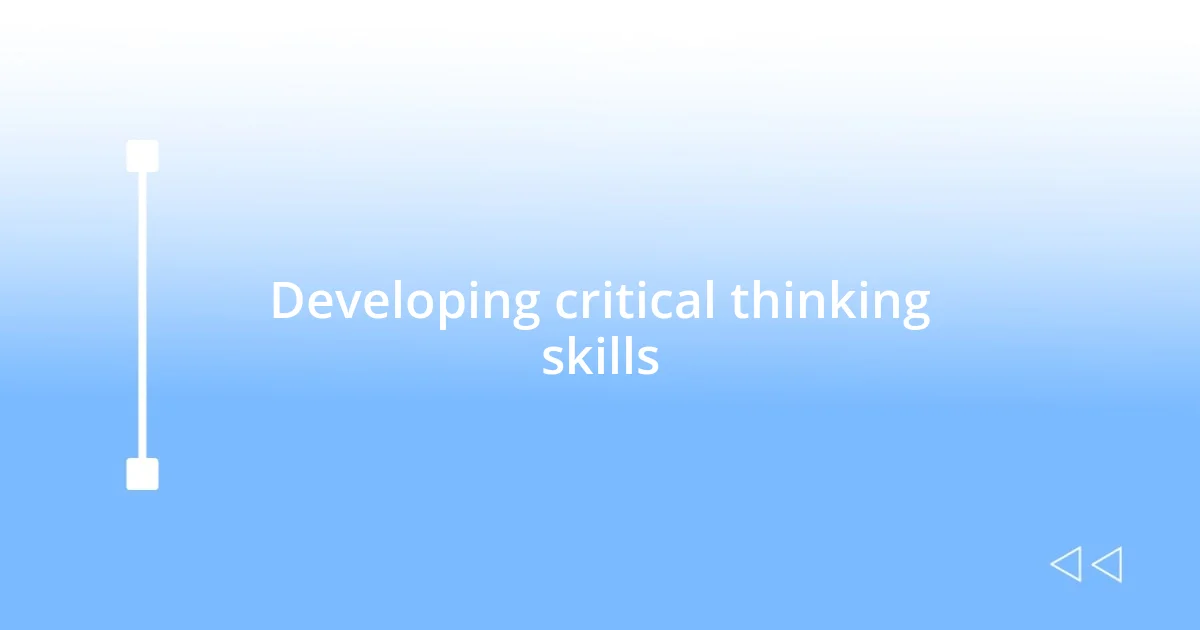
Developing critical thinking skills
Engaging with political podcasts has significantly sharpened my critical thinking skills. One memorable instance was during a discussion about climate policies. Listening to varying viewpoints challenged me to question my previously held beliefs. I found myself pondering: Why did I initially dismiss alternative solutions? This reflection pushed me to analyze issues from multiple angles, cultivating a more nuanced understanding.
I also remember an episode that delved into media bias; it kept me on my toes. The hosts dissected how narratives can be shaped by the media’s presentation of information. I had always thought of myself as unbiased, but the conversation made me realize how easily I could be influenced by the channels I consume. What if I’ve only been reading articles that reinforce my views? This realization was a bit uncomfortable but ultimately empowering. It encouraged me to seek out sources that challenge my opinions, which is essential for developing a more informed perspective.
Moreover, the podcasts often engage in real-time political analysis that requires immediate critical evaluation. I recall an instance while listening to a podcast during a national debate night. The hosts’ instant reactions prompted me to think critically about each candidate’s statements right there and then. I appreciated this immersive experience; it wasn’t just about absorbing information, but actively analyzing it. It made me ask: How do my views hold up against live political discourse? That moment solidified for me the importance of applying critical thinking in real-world situations, enhancing my political engagement overall.
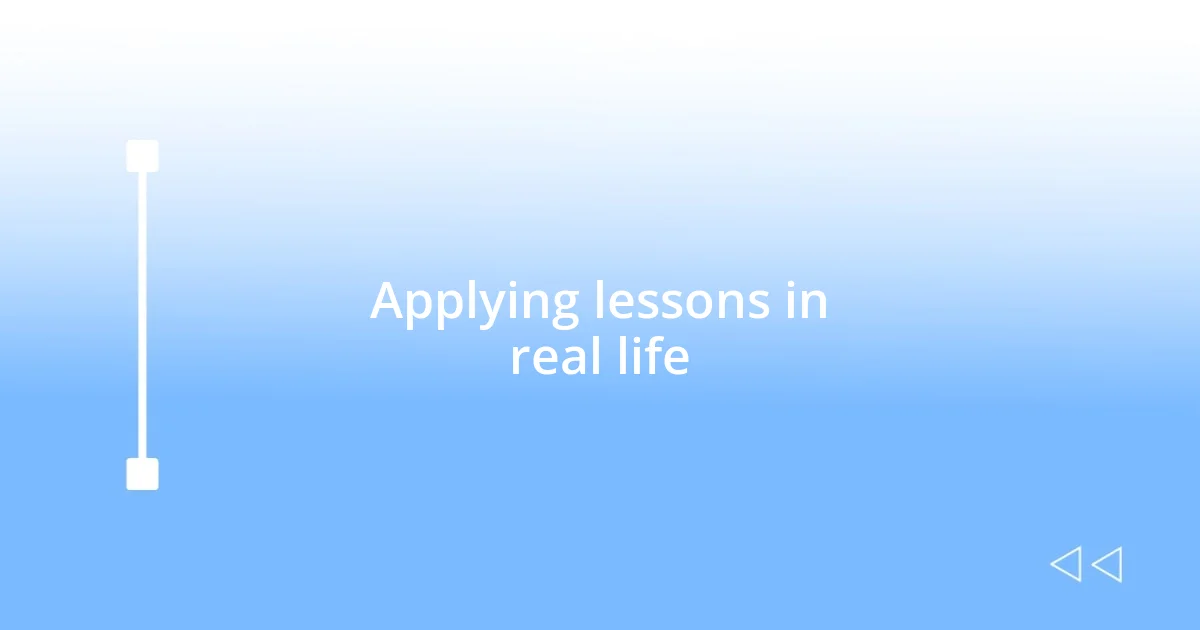
Applying lessons in real life
Listening to political podcasts has inspired me to take action in my community. One Saturday, I attended a town hall meeting that I initially would have avoided. Armed with insights from an episode about local engagement, I found myself asking questions and voicing my concerns. It was exhilarating to realize that my presence and participation could influence local decisions. Have you ever felt that rush of empowerment from stepping out of your comfort zone?
Another lesson I integrated into my life came from a discussion on political apathy. The hosts emphasized how crucial it is to turn frustration into action. Feeling disenchanted with the political climate, I used that energy to volunteer for a campaign. It was eye-opening to witness firsthand the impact a dedicated team can have during an election cycle. I often wonder, how many others out there feel helpless and don’t realize they can channel their feelings into something productive?
Additionally, the concept of respectful discourse became a practical tool I started using in my daily interactions. After listening to an episode focused on navigating challenging conversations, I decided to engage with a colleague whose views often clash with mine. Rather than jumping into a rebuttal, I approached our chat with curiosity. This shift led to a surprising and meaningful exchange. How can our conversations change if we prioritize understanding over winning an argument? The potential for deeper connections is truly inspiring.



